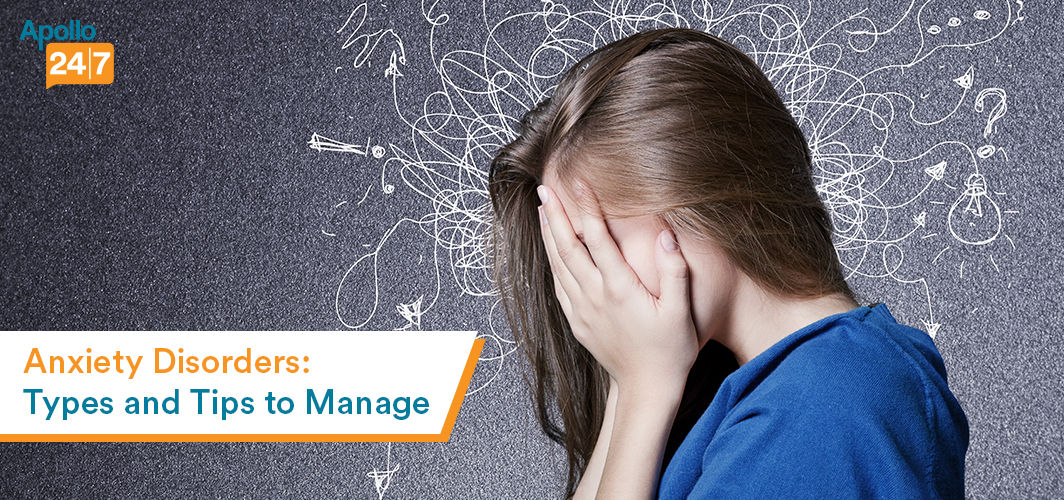General Health
Anxiety Disorders: Types and Tips to Manage It
5 min read
By Apollo 24|7, Published on - 21 July 2022, Updated on - 12 November 2022
Share this article
0
66 likes

We all often experience a certain level of anxiousness now and then. Scientists suggest that certain levels of stress can help people achieve their goals and pursue their passion better. However, excess anxiety can result in a disorder that can affect the quality of life significantly.
What is an anxiety disorder?
Anxiety disorders are characterized by persistent fear, overthinking, or intense worrying about known or unknown issues that interfere with day-to-day activities for at least six months. However, doctors claim that anxiety can be effectively managed with some lifestyle alterations and medical treatment.
Why is it important to seek medical help?
Persistently untreated anxiety leads to the excess release of stress hormone (cortisol), high blood pressure, weight gain, sexual dysfunction, Cushing syndrome, diabetes, and heart & kidney diseases.
A study of brain scans published in the journal Lancet highlighted that people with anxiety disorders showed significant activity around the amygdala of the brain. Furthermore, the study indicated that people with more activity in the amygdala region were prone to strokes and heart diseases than people without anxiety disorders.
What are the types of anxiety disorders?
-
Agoraphobia: Agoraphobia is a type of anxiety disorder in which people are fearful, anxious, and reluctant to face certain circumstances, places & situations. People living with this disorder try and avoid such places and similar problems due to sad events connected with those places.
-
Generalized anxiety disorder (GAD): Anxiety is not limited to a single situation or problem, when one issue resolves, the mind focuses on other issues immediately, and the chain continues. Research suggests that GAD can be inherited by parents or can be a result of childhood abuse and bullying at school.
-
Panic disorder: This disorder can only be characterized if a person has or had at least 2 to 3 episodes of sudden shaking, fear of death, chest pain, breathlessness, and uncontrolled palpitations for several minutes without any trigger.
-
Separation anxiety disorder: As the name suggests, this disorder can affect children and adults when they get separated from their parents, grandparents, or a loved one. People with separation anxiety disorders often feel home-sick and may need to visit parents, partners, and loved ones in short intervals to feel better. A sudden separation can also cause depression, distress, anxieties, and unexplainable pain.
-
Selective mutism: Selective mutism is often seen in children but may also affect adults who do not speak in social settings such as schools and colleges. These people may feel comfortable at home or with friends.
-
Social phobia: As the name suggests, in this disorder the person feels conscious and avoids social gatherings.
-
Post-traumatic stress disorder (PTSD): A person is said to have PTSD if they would have witnessed or gone through terrifying events such as accidents, death of a loved one, domestic violence, and physical, or mental stress. The symptoms include flashbacks, nightmares, fear, unexplained crying, and extreme anxiety. This disorder needs special attention and care from doctors, family members & caregivers. However, with the help of effective medicines, proper treatment, care & lifestyle changes one can easily overcome PTSD in 2-3 months.
Effect of Covid 19 in people with anxiety disorders
According to Lancet and the CDC, the COVID-19 pandemic, social distancing norms, financial setbacks, and monotonous routines have adversely affected many people's mental health and have increased anxieties in people of all ages.
Along with COVID-19 prevention measures, organizations are laying special emphasis on their employees' mental health, especially in work-from-home scenarios, to improve work-life balance. Health experts recommend practicing yoga or exercise regime, adequate nutrition, and relaxing techniques to overcome anxieties.
Tips to manage anxiety and overcome anxiety disorders
- Try not to sleep till late, wake up early in the morning. Perform a 20-minute yoga, pranayams, or any exercise to energize yourself.
- Consume breakfast 1-hour post waking up, lunch between 1 to 2 pm, and dinner between 8-9 pm. Make sure your meals are low in carbs and rich in vitamins, proteins & fibre.
- Start your day & work on a positive note and give yourself realistic self-targets.
- Drink at least 2 litres of water, take healthy snacks every 2-3 hours, and cut down on sugar & caffeine. Consume decaffeinated or filtered coffee.
- Run or jog for 15 mins or brisk walk for 45 mins. On alternate days, play any sport or take up activities such as badminton, tennis, or swimming.
- Playing light music, and using aromatic room fragrances, body sprays, body oil, and shower gels can help to uplift mood & lower anxiety.
- Destress on all weekends. Go for drives, plan a trip nearby or spend time with a partner, family & friends. Go for a short vacation once in three months to break the monotony.
- If you are under any treatment or medications, take them on time. Follow the advice of the doctor. Do not stop taking any medication on your own. However, sleep for at least 7 hours despite taking all steps if you are still experiencing anxiety.
Anxiety is a common condition yet ignored due to the social stigma attached to it. However, by seeking early help from a professional along with motivation from family and friends, one can easily overcome anxiety-related disorders. Remember to practice mindfulness, exercise at least five days a week and stay happy as happiness is a state of mind, and it starts with you.
For more information, Consult with best psychiatrists near you
- Authored by Dr. Tulika Roy
General Health
Leave Comment
Recommended for you

General Health
Chickenpox Diet: What To Eat And What Not To Eat
Discover a balanced Chickenpox diet. Learn which foods to include for a quicker recovery and which ones to avoid. Promote healing with proper nutrition.

General Health
The Role of Zinc in Promoting Better Health
Zinc is an essential nutrient that supports growth during childhood and maintains the functioning of the immune system.

General Health
7 Health Benefits Of Pumpkin Seeds
Discover the numerous health benefits of pumpkin seeds, from improved heart health to enhanced immunity.
Subscribe
Sign up for our free Health Library Daily Newsletter
Get doctor-approved health tips, news, and more.
Visual Stories

Plant-based Foods That Are a Great Source of Iron
Tap to continue exploring
Recommended for you

General Health
Chickenpox Diet: What To Eat And What Not To Eat
Discover a balanced Chickenpox diet. Learn which foods to include for a quicker recovery and which ones to avoid. Promote healing with proper nutrition.

General Health
The Role of Zinc in Promoting Better Health
Zinc is an essential nutrient that supports growth during childhood and maintains the functioning of the immune system.

General Health
7 Health Benefits Of Pumpkin Seeds
Discover the numerous health benefits of pumpkin seeds, from improved heart health to enhanced immunity.